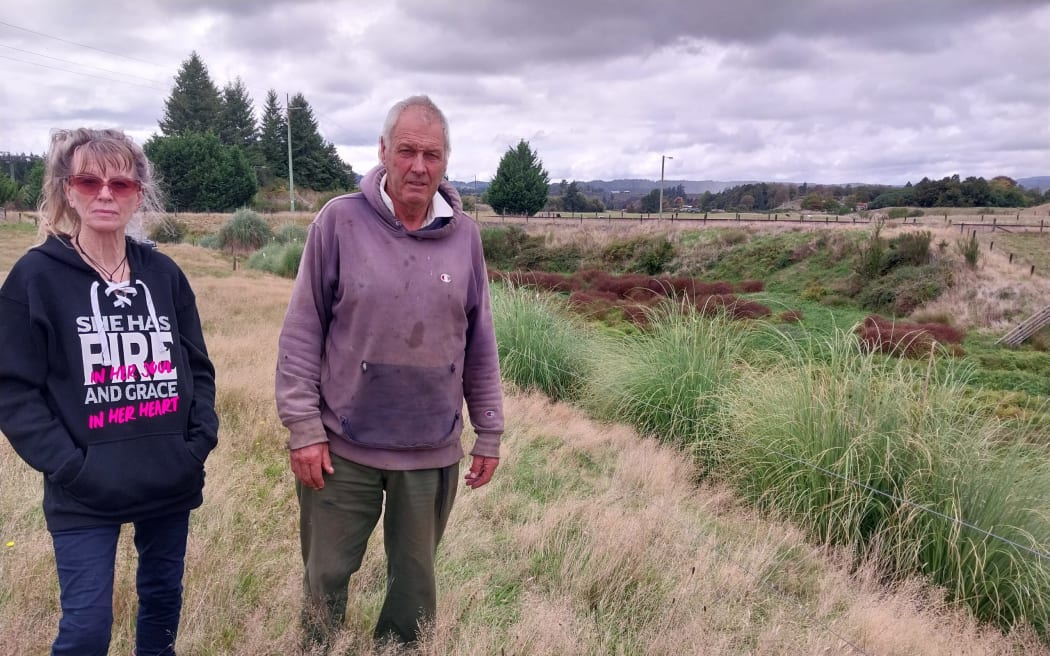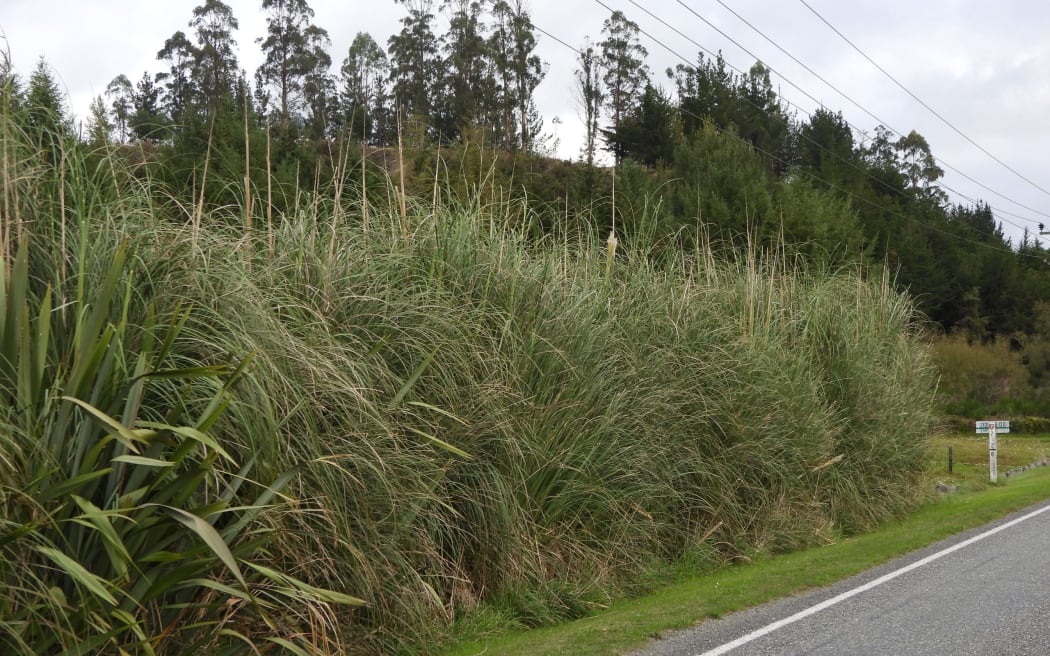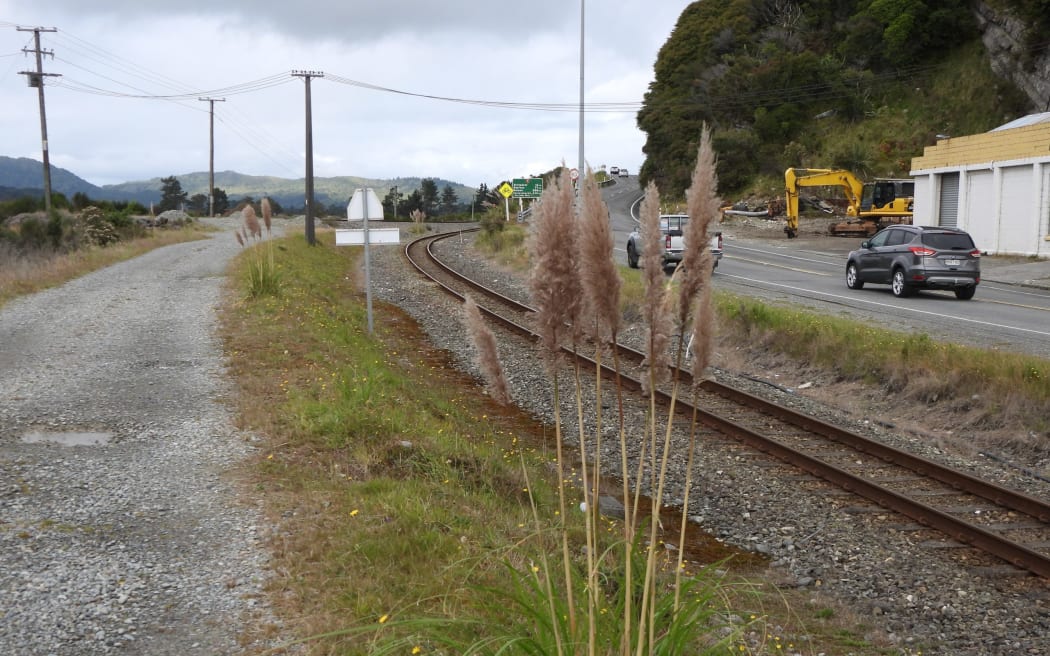
Marianne and Ken O'Malley are unhappy at the West Coast Regional Council's approach about removing pampas from their property, including the former gold dredge pond area to their left. Photo: Brendon McMahon / Greymouth Star
Ikamatua landowners ordered to remove pest pampas grass by the West Coast Regional Council are upset at a "bolshie approach".
Two landowners on the outskirts of the Grey Valley township have locked horns with the regional council after an initial approach by council staff upset them.
Marianne O'Malley said it all began about a year ago.
The officer's "bolshie approach" at the time did not sit well, which was further aggravated by a subsequent notice warning they could face a fine of between $50,000 and $200,000 if they did not remove the plant, she said.
"We've had a bit of a battle."

Marianne O'Malley said she felt the officer was "antagonistic" and it riled her husband Ken, who refused to give the council staff member permission to walk onto their property.
"There was no ask, or would you mind … It wasn't nice," she said.
If council wanted them to manage it then they needed to take a better approach.
Ken O'Malley said the initial approach by council had been arrogant and he reacted: "I said, you're not going over."
"Then it got a wee bit nasty," Marianne O'Malley added.
The O'Malleys believe council staff initially spotted the problem pampas from the roadside, by looking across a paddock, to where it is growing around a former gold dredge pond.

This thicket of pampas growing outside the property of Roger Hampton on State Highway 7. Photo: Brendon McMahon / Greymouth Star
When the officer visited their house about it he also flagged the ornamental gunnera in their landscaped garden.
Both pampas and gunnera are on the list in a pest plant plan for the region.
The subsequent notice from council, including ordering the removal of the gunnera from their garden and the pampas, only aggravated matters, the couple said.
Marianne O'Malley said the council's subsequent suggestion they cut and spray the pampas was unrealistic given the physical difficulty of getting into the hazardous pond area.
The couple say they would need to pay for a helicopter to do the job.
"It's a major task; it's a bit too much for two pensioners."
The pond was a habitat for eels and whistling frogs, with an outlet to the Grey River, Marianne O'Malley said.
"If they spray that, that's the ecology gone."
After nearly a year, Marianne O'Malley said they have been advised a council manager would visit them in the next 10 days to come up with "a management plan".
"We just want to try and sort it," she said.
Ken O'Malley said they are flummoxed why pampas is being flagged as an issue on the West Coast, noting it grew freely in Canterbury farming areas.
His father began planting it on their property 56 years ago, "and it hasn't spread".
It was originally used as green feed for cattle in the winter, plus shelter.
"The cattle will eat it right down to nothing and then it will regrow again."

This pink flowering pampas, about 200m from the Greymouth CBD, is a common sight along the road and rail network in the area. Photo: Brendon McMahon / Greymouth Star
Another Ikamatua property owner, Roger Hampton, said the pampas fronting his property just north of the settlement was probably growing on road reserve bordering State Highway 7, so technically not his problem.
He said he planted it decades ago and from what he could see it had not been a weed source.
"What the hell's wrong with it.
"It's been there for 40 years and hasn't spread. What harm does it do?"
Regional Council operations manager Shanti Morgan has been approached for comment today.
In March, she told LDR that council has recently beefed up enforcing its pest plant control obligations under the Biosecurity Act.
They had two biosecurity staff making a first approach to property owners where the pampas had been identified.
Failing direct contact an "inspection notice" would be issued.
Morgan said this was "a signal" to property owner rather than council going straight to enforcement action.
"Enforcement is not something that we want to do -- we haven't done it very often to date. We try to leave that as a last resort. We want to work with people."
LDR is local body journalism co-funded by RNZ and NZ On Air



